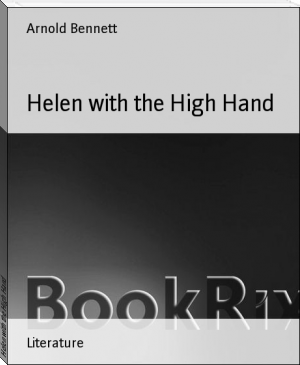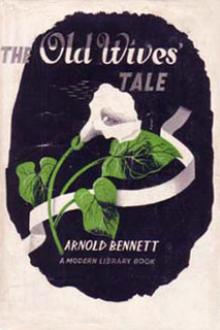Helen with the High Hand - Arnold Bennett (debian ebook reader .txt) 📗

- Author: Arnold Bennett
Book online «Helen with the High Hand - Arnold Bennett (debian ebook reader .txt) 📗». Author Arnold Bennett
Anyhow, he knew it was not scrambled eggs, because you have to stir scrambled eggs without ceasing.
Then she stopped and stood quite still, regarding the saucepan.
"You've watched me quite long enough," she said, without moving her head. She must have known all the time that he was there.
So he shuffled away, and glanced out of the window at the stir and traffic of Trafalgar-road.
"Tea's ready," she said.
He went into the kitchen, smiling, enchanted, but disturbed. She had not come to him and confessed that she could not make tea without tea-leaves. Yet there was the teapot steaming and puffing on the table!
CHAPTER VIII
OMELETTE
The mystery lay on a plate in the middle of the table. In colour it resembled scrambled eggs, except that it was tinted a more brownish, or coppery, gold--rather like a first-class Yorkshire pudding. He suspected for an instant that it might be a Yorkshire pudding according to the new-fangled recipe of Board Schools. But four eggs! No! He was sure that so small a quantity of Yorkshire pudding could not possibly have required four eggs.
He picked up the teapot, after his manner, and was in the act of pouring, when she struck him into immobility with a loud cry:
"Milk first!"
He understood that she had a caprice for pouring the tea on the top of the milk instead of the milk on the top of the tea.
"What difference does it make?" he demanded defiantly.
"What!" she cried again. "You think yourself a great authority on China tea, and yet you don't know that milk ought to be poured in first! Why, it makes quite a different taste!"
How in the name of Confucius did she know that he thought himself a great authority on China tea?
"Here!" she said. "If you don't mind, I'll pour out the tea. Thank you. Help yourself to this." She pointed to the mystery. "It must be eaten while it's hot, or it's worse than useless."
"What is it?" he asked, with false calm.
"It's a kidney omelette," she replied.
"Omelette!" he repeated, rather at a loss. He had never tasted an omelette; he had never seen an omelette. Omelettes form no part of the domestic cuisine of England. "Omelette!" he repeated. How was he familiar with the word--the word which conveyed nothing to his mind? Then he remembered: "You can't make an omelette without breaking eggs." Of course she had broken eggs. She had broken four eggs--she had broken the entire household stock of eggs. And he had employed that proverb scores, hundreds of times! It was one of half-a-dozen favourite proverbs which he flung at the less sagacious and prudent of his tenants. And yet it had never occurred to him to wonder what an omelette was! Now he knew. At any rate, he knew what it looked like; and he was shortly to know what it tasted like.
"Yes," she said. "Cut it with a knife. Don't be frightened of it. You'll eat _it_; it won't eat you. And please give me very little. I ate a quarter of a pound of chocolates after dinner."
He conveyed one-third of the confection to his plate, and about a sixth to hers.
And he tasted--just a morsel, with a dash of kidney in the centre of it, on the end of his fork. He was not aware of the fact, but that was the decisive moment of his life--sixty though he was!
Had she really made this marvel, this dream, this idyll, this indescribable bliss, out of four common fresh eggs and a veal kidney that Mrs. Butt had dropped on the floor? He had come to loathe kidney. He had almost come to swearing that no manifestation or incarnation of kidney should ever again pass between his excellent teeth. And now he was ravished, rapt away on the wings of paradisaical ecstasy by a something that consisted of kidney and a few eggs. This omelette had all the finer and nobler qualities of Yorkshire pudding and scrambled eggs combined, together with others beyond the ken of his greedy fancy. Yes, he was a greedy man. He knew he was greedy. He was a greedy man whose evil passion had providentially been kept in check for over a quarter of a century by the gross unskilfulness, the appalling monotony, of a Mrs. Butt. Could it be that there existed women, light and light-handed creatures, creatures of originality and resource, who were capable of producing prodigies like this kidney omelette on the spur of the moment? Evidently! Helen existed. And the whole omelette, from the melting of the butter to the final steady glance into the saucepan, had not occupied her more than six minutes--at most. She had tossed it off as he might have tossed off a receipt for a week's rent. And the exquisite thought in his mind, the thought of penetrating sweetness, was that whence this delicacy had come, other and even rarer delicacies might have come. All his past life seemed to him to be a miserable waste of gloomy and joyless years.
"Do you like it?" she inquired.
He paused, as though reflecting whether he liked it or not. "Ay," he said, judicially, "it's none so bad. I could do a bit more o' that."
"Well," she urged him, "do help yourself. Take it all. I shan't eat any more."
"Sure?" he said, trembling lest she might change her mind.
Then he ate the remaining half of the omelette, making five-sixths in all. He glanced at her surreptitiously, in her fine dress, on which was not a single splash or stain. He might have known that so extraordinary and exotic a female person would not concoct anything so trite as a Yorkshire pudding or scrambled eggs.
Not till the omelette was an affair of the past (so far as _his_ plate was concerned) did he begin to attend to his tea--his tea which sustained a mystery as curious as, and decidedly more sinister than, the mystery of the omelette.
He stared into the cup; then, to use the Five Towns phrase, he supped it up.
There could be no doubt; it was his special China tea. It had a peculiar flavour (owing, perhaps, to the precedence given to milk), but it was incontestably his guarded and locked tea. How had she got it?
"Where didst find this tea, lass?" he asked.
"In the little corner cupboard in the scullery," she said. "I'd no idea that people drank such good China tea in Bursley."
"Ah!" he observed, concealing his concern under a mask of irony, "China tea was drunk i' Bursley afore your time."
"Mother would only drink Ceylon," said she.
"That doesna' surprise me," said he, as if to imply that no vagary on the part of Susan could surprise him. And he proceeded, reflectively: "In th' corner cupboard, sayst tha?"
"Yes, in a large tin box."
A large tin box. This news was overwhelming. He rose abruptly and went into the scullery. Indubitably there was a large tin box, pretty nearly half full of his guarded tea, in the corner cupboard.
He returned, the illusion of half a lifetime shattered. "That there woman was a thief!" he announced.
"What woman?"
"Mrs. Butt."
And he explained to Helen all his elaborate precautions for the preservation of his China tea. Helen was wholly sympathetic. The utter correctness of her attitude towards Mrs. Butt was balm to him. Only one theory was conceivable. The wretched woman must have had a key to his caddy. During his absence from the house she must have calmly helped herself to tea at five shillings a pound--a spoonful or so at a time. Doubtless she made tea for her private consumption exactly when she chose. It was even possible that she walked off from time to time with quantities of tea to her own home. And he who thought himself so clever, so much cleverer than a servant!
"You can't have her back, as she isn't honest, even if she comes back," said Helen.
"Oh, her won't come back," said James. "Fact is, I've had difficulties with her for a long time now."
"Then what shall you do, my poor dear uncle?"
"Nay," said he, "I mun ask you that. It was you as was th' cause of her going."
"Oh, uncle!" she exclaimed, laughing. "How can you say such a thing?" And she added, seriously: "You can't be expected to cook for yourself, can you? And as for getting a new one--"
He noticed with satisfaction that she had taken to calling him simply uncle, instead of great-stepuncle.
"A new 'un!" he muttered, grimly, and sighed in despair.
"I shall stay and look after your supper," she said, brightly.
"Yes, and what about to-morrow?" He grew gloomier.
"To-morrow's Sunday. I'll come to-morrow, for breakfast."
"Yes, and what about Monday?" His gloom was not easily to be dispersed.
"I'll come on Monday," she replied, with increasing cheerfulness.
"But your school, where ye teach everything, lass?"
"Of course, I shall give up school," said she, "at once. They must do without me. It will mean promotion for some one. I can't bother about giving proper notice. Supposing you had been dangerously ill, I should have come, and they would have managed without me. Therefore, they _can_ manage without me. Therefore, they must."
He kept up a magnificent gloom until she left for the night. And then he danced a hornpipe of glee--not with his legs, but in his heart. He had deliberately schemed to get rid of Mrs. Butt by means of Helen Rathbone. The idea had occurred to him as he entered the house. That was why he had encouraged her to talk freely about servants by assuring her that Mrs. Butt was not in the scullery, being well aware that Mrs. Butt was in the scullery. He had made a tool of the unsuspecting, good-natured Helen, smart though she was! He had transitory qualms of fear about the possible expensiveness of Helen. He had decidedly not meant that she should give up school and nearly thirty shillings a week. But, still, he had managed her so far, and he reckoned that he could continue to manage her.
He regretted that she had not praised his music. And Helen wrote the





Comments (0)